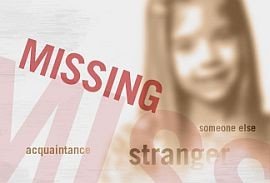
Have you ever experienced losing your child even for only a few moments? Those few moments are the worst moments in your life. In just a few seconds your mind starts racing and throwing out all the most horrifying thoughts possible. Your heart is beating so hard you can feel it in your throat. You may start sweating as panic sets in while you frantically search and call his/her name. Then all of the sudden he or she comes out from under the clothes rack giggling because he/she thinks it’s funny. You’re too angry to think it’s funny, you say something like, “I thought you’d been taken away by a stranger.” Or “Mommy/Daddy thought you were lost.” Or “Don’t do that ever again, don’t you know that some people steal children and hurt them.” To them it was just a game of hide & seek, you were just left out of the details.
We try to teach our children about “Stranger Danger,” but do they understand what we’re teaching them? When my kids were small I always told them not to talk to strangers but they were such friendly kids they talked to anyone they ran into, my daughter especially. To a mother that’s a double-edged sword, we want our children to be social but at the same time we want them to be safe. Children are inherently good-hearted & trusting of most adults. Think about the adults in most children’s lives… they have mom and dad who love them and protect them, they have grandparents who spoil them rotten, they have teachers that are kind to them, and they have aunts & uncles who love them. Many children are surrounded by people who love & protect them so they have no understanding of someone they can’t trust. But, even as social as my daughter was there were people she would withdraw from, perhaps there was something about them that she didn’t like or they exhibited behavior unlike anyone else in her life. That “warning” feeling we get about certain people, places, or situations is called intuition and even small children have it, they just don’t understand completely how to act upon it. We have to teach them.
I recently watched a social experiment video where this guy with a puppy asks random moms in the park if he can talk to their kids to see if the kids will talk to him. All the moms told him yes feeling confident that their child wouldn’t talk to him because they talk to their kids about stranger danger all the time. Each mom in the video is horrified to watch their children not only talk to this stranger but take his hand and walk away to “go see the other puppies.”
At one of my recent PDR classes we set up a scenario for some of our younger students 8, 12, & 15 to see what they would do. The scenario looks like this: The “bad guy” (who looks like a “normal” person aside from protective padding) was in the parking lot looking for something. Each kid was to walk to their mom’s car to get their cell phone they forgot. The “bad guy” tells them he dropped his keys and asked if they would help him look for them. I know these kids so I thought for sure they would say no and run back into the public building they just
walked out of, but with each scenario they all started to help him look. I was stunned. I won’t give away the rest of the scenario in case you take the class but let me just say their response to the scenario was definitely less desirable. After they each took their turn with this scenario I then discussed with them some more desirable options that would have helped them avoid a dangerous situation rather than having to possibly defend themselves against an abductor/attacker.
If we talk to our kids about not talking to strangers do they truly understand what we are talking about? Are you confident your child wouldn’t talk to a stranger in the park, or in a parking lot, or walking home from school? Until our children, or we ourselves, encounter a situation we won’t know how they/we will act. With our class, students are given the opportunity to experience a real life scenario and see how they react and then put to the test the tools/tactics they have been taught. If their response to the scenario was “less desirable” then we discuss the scenario, giving them opportunity to think about more desirable options, and/or we help them with some more desirable options. They are then given the opportunity to go through the scenario again using some of the more desirable options. This builds in them awareness of their surroundings, listening to their intuition, recognizing dangerous behaviors, and the confidence to know how to act.
Its summer and kids have a lot more free time and a lot more chances of running into a dangerous situation. Seniors going off to college? Do they know how to recognize dangerous behaviors, avoiding dating violence, avoiding rape, avoiding violent attack, and ultimately how to protect themselves? Email me, k.maloy@triunedefense.net, for more information on anti-abduction classes, college-bound senior classes, and other Personal Defense Readiness Fundamentals™ classes. Please visit our website, www.triunedefense.net, for more information about our currently scheduled classes.